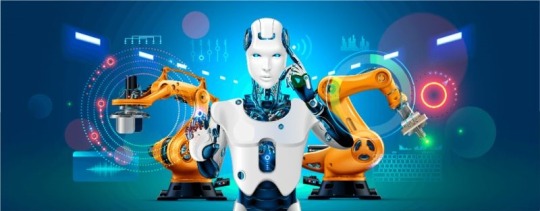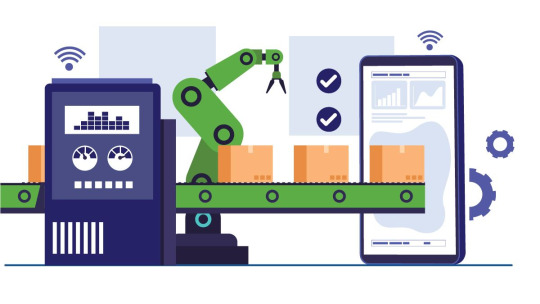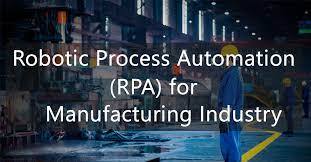#RPA in Manufacturing
Text
Revolutionizing Manufacturing: Sparsh Communications' Bespoke RPA Solutions

In the fast-paced world of manufacturing, staying ahead is not a choice but a necessity. To thrive, businesses must embrace innovative technologies, and Robotic Process Automation (RPA) has emerged as a game-changer. Sparsh Communications specializes in crafting tailored RPA solutions exclusively for manufacturing companies, ushering in a new era of efficiency and revenue growth across the entire value chain.
Redefining Efficiency with RPA in Manufacturing
Picture a manufacturing landscape where once arduous tasks are executed with precision and speed. This vision becomes reality with Sparsh's custom RPA solutions, designed to automate rule-based operations seamlessly integrating with existing legacy systems.
Unlocking the Potential of Robotic Process Automation in Manufacturing
RPA in manufacturing leverages software robots to automate repetitive tasks, aiming for elevated efficiency, reduced errors, and liberated human resources. Tangible benefits include mastery over business processes, elevated employee performance, cost savings, and an exceptional return on investment.
Common RPA Use Cases in Manufacturing
Inventory Management: Automating ordering, tracking, and reporting of inventory levels.
Invoice Processing: Streamlining invoice generation, verification, tracking, and payment processing.
Customer Service: Enhancing communication and service through automated reminders, contact schedules, and data access.
Purchase Order Management: Simplifying creation, approval, and tracking of purchase orders.
Bill of Materials (BOM): Efficiently crafting BOMs, gathering information, and eradicating manual errors.
Supply Chain Management: Automating order processing, invoice management, shipment tracking, and enhancing communication throughout the supply chain.
Data Migration: Utilizing RPA bots to simplify and cost-effectively manage data movement between platforms.
Steps for Successful RPA Implementation in Manufacturing
Identify Objectives: Clearly outline reasons and goals for integrating RPA into manufacturing processes.
Process Analysis: Scrutinize current processes to pinpoint repetitive tasks suitable for automation.
RPA Tool Evaluation: Explore various tools, assessing efficiency, capabilities, and pricing to select the ideal one.
Implement RPA Software: Seamlessly integrate chosen RPA software, configuring it to align with existing systems.
Continuous Optimization: Monitor RPA bots' performance, identifying areas for refinement to maximize efficiency.
Why Choose Sparsh for RPA Implementation?
Sparsh is your steadfast partner in RPA implementation for manufacturing. We offer bespoke services tailored to specific needs, from pain point identification to AI-infused RPA solutions. Expect comprehensive support from strategy inception to deployment and maintenance.
Elevate Your Manufacturing Business with RPA: The Unparalleled Advantages
Unprecedented Efficiency: Automate tasks, dramatically expediting processes for skyrocketing productivity.
Cost-Efficiency: Streamline operations, reducing the need for manual labor, leading to substantial cost savings.
A Symphony of Accuracy: RPA bots perform tasks with unwavering consistency, minimizing the risk of errors.
Flexibility Beyond Measure: Bots can be scaled effortlessly, meeting fluctuating production demands.
Real-Time Insights: RPA systems collect and process data in real-time, empowering better decision-making.
Seamless Integration: RPA seamlessly integrates with legacy systems, eliminating disruptions in ongoing operations.
Regulatory Compliance Made Simple: RPA automates compliance-related tasks, ensuring adherence to regulations.
Empower Your Workforce: Automate repetitive tasks, liberating your workforce to focus on strategic activities.
Streamlined Supply Chain: RPA automates processes, reducing delays and improving communication in the supply chain.
Speed to Market: Automate tasks like inventory management, leading to shorter lead times and faster product launches.
In Conclusion: Pioneering the Future of Manufacturing with RPA
Embracing RPA is not an option but a strategic imperative for manufacturing businesses. Sparsh stands as your trusted RPA development partner, offering solutions tailored for the unique demands of manufacturing. Redefine your manufacturing operations with Sparsh and let the transformative power of automation revolutionize your business. Lead into the future with Sparsh and RPA by your side.
0 notes
Text
Revolutionizing Manufacturing Operations Through Robotic Process Automation

In the ever-evolving realm of manufacturing, staying at the forefront isn't merely a choice but an essential pursuit. To truly thrive and propel into the future, businesses must adopt avant-garde technologies. Robotic Process Automation (RPA) is one such transformative force reshaping the manufacturing landscape. At Sparsh, our expertise lies in crafting bespoke RPA Offerings, empowering manufacturing enterprises to achieve unprecedented efficiency, revenue growth, and operational streamlining throughout their value chain.
Efficiency Redefined: The Impact of RPA in Manufacturing
Envision a manufacturing landscape where once tedious and time-consuming tasks are executed with impeccable precision and unprecedented speed. This is the power of RPA in manufacturing. Our tailor-made RPA solutions automate rule-based operations, ensuring each task is executed with unmatched accuracy and efficiency. This automation seamlessly integrates with existing legacy systems, providing real-time results capable of revolutionizing business operations.
Unlocking the Potential: FAQs about RPA in Manufacturing
What is Robotic Process Automation (RPA) in manufacturing?
RPA in manufacturing involves leveraging software robots or bots to automate repetitive and rule-based tasks. This optimization of business processes aims to enhance efficiency, minimize errors, and free up human resources for more strategic, value-added activities.
What are the tangible benefits of implementing RPA in the manufacturing industry?
Implementing RPA in manufacturing yields a range of benefits, including mastery over business processes, enhanced employee performance, reduced errors, cost savings, and exceptional return on investment (ROI) through the automation of mundane tasks.
Examples of common use cases for RPA in manufacturing:
RPA finds applications across various facets of manufacturing, including inventory management, invoice processing, customer service, purchase order management, bill of materials (BOM) creation, supply chain management, and data migration.
Critical Steps for Successful RPA Implementation in Manufacturing
To ensure successful RPA integration in manufacturing, follow these crucial steps:
Identify Objectives: Clearly outline reasons and goals for integrating RPA.
Process Analysis: Scrutinize current processes to identify tasks suitable for automation.
RPA Tool Evaluation: Explore various RPA tools to select the ideal one based on efficiency, capabilities, and pricing.
Implement RPA Software: Seamlessly integrate chosen RPA software into production processes.
Continuous Optimization: Monitor RPA bot performance, identify areas for refinement, and make necessary adjustments for maximum efficiency.
Why Sparsh for RPA Implementation in Manufacturing?
Choose Sparsh as your trusted partner for RPA implementation in manufacturing. Our bespoke RPA services are meticulously tailored to the unique needs of manufacturing enterprises. From pain point identification to basic and advanced process automation and AI-infused RPA solutions, Sparsh provides comprehensive support from strategy inception to deployment and maintenance.
Elevating Manufacturing Business with RPA: Unparalleled Advantages
1. Unprecedented Efficiency: RPA breathes life into manufacturing operations, automating tasks and dramatically expediting processes, leading to skyrocketing productivity levels.
2. Cost-Efficiency: RPA streamlines operations, reducing the need for human intervention in mundane activities, resulting in substantial cost savings through decreased labor expenses and error elimination.
3. A Symphony of Accuracy: RPA bots perform tasks with unwavering consistency, minimizing errors associated with human intervention, leading to impeccable data accuracy and a boost in product quality.
4. Flexibility Beyond Measure: RPA provides scalability and flexibility to meet dynamic production demands, allowing for effortless scaling up or down to accommodate varying workloads.
5. Real-Time Insights: RPA systems collect and process data in real-time, empowering manufacturers with insights for better decision-making, proactive issue resolution, and enhanced planning and forecasting.
6. Seamless Integration: RPA seamlessly integrates with existing legacy systems, eliminating the need for costly system replacements or extensive IT infrastructure overhauls.
7. Regulatory Compliance Made Simple: RPA automates compliance-related tasks, ensuring strict adherence to regulations, mitigating risks, and simplifying accurate documentation and reporting.
8. Empower Your Workforce: RPA enhances human capabilities by automating repetitive tasks, freeing up the workforce to focus on strategic activities, leading to heightened satisfaction, skill development, and innovation.
9. Streamlined Supply Chain: RPA streamlines supply chain management by automating processes such as order processing, invoice management, and shipment tracking, reducing delays and improving communication with suppliers.
10. Speed to Market: RPA accelerates product development and launch cycles by automating tasks such as bill of materials creation, inventory management, and data migration, leading to shorter lead times and faster product launches.
Conclusion: Embracing a Future Fuelled by RPA in Manufacturing
In conclusion, the integration of Robotic Process Automation (RPA) into the manufacturing landscape marks not just a technological evolution but a strategic imperative. The transformative power of RPA, as illustrated by Sparsh's tailored solutions, unveils a new era of unparalleled efficiency, cost-effectiveness, and operational precision. With manufacturing tasks seamlessly automated, businesses can not only meet the demands of today's fast-paced industry but also position themselves as pioneers shaping the future.
As manufacturing enterprises venture into this RPA-driven future, Sparsh stands as a steadfast ally, offering more than just solutions – a comprehensive partnership. From the inception of strategic plans to the ongoing maintenance of RPA systems, Sparsh ensures a seamless journey toward enhanced accuracy and efficiency. The advantages outlined, from unprecedented flexibility to streamlined supply chains, herald a future where manufacturing isn't just about production but a symphony of innovation and strategic prowess. Embrace RPA with Sparsh, and embark on a transformative journey toward manufacturing excellence.
0 notes
Text
Tailored Services: RPA Services for the Manufacturing Industry
There is a broad range of other RPA use cases in manufacturing apart from the above-mentioned ones in the vast manufacturing industry. If you feel like your business is not moving into the digital age quickly enough and existing systems are too complex or old to integrate and automate, then ESS RPA consultants can help you to move forward with your RPA goals faster.

Elevate your manufacturing with specialized RPA services. Unlock tailored solutions that optimize processes and drive efficiency in your industry.
#RPA in manufacturing industry#RPA in manufacturing sector#Manufacturing RPA use cases#Benefits of RPA in manufacturing#RPA manufacturing use cases#Robotic process automation for manufacturing#RPA in manufacturing use cases#RPA services for manufacturing industry#Robotic process automation use cases in manufacturing#RPA manufacturing case study#Robotic process automation for manufacturing companies#Manufacturing RPA#Robotic process automation manufacturing#Robotic process automation in manufacturing#Manufacturing use cases in RPA#Robotic process automation in manufacturing industry#RPA use cases in manufacturing industry#RPA for manufacturing#RPA manufacturing#RPA in manufacturing
0 notes
Text
Robotic Process Automation in Manufacturing Industry

In a world of Industrial Revolution 4.0., Robotic Process Automation in manufacturing is one of the innovative ways manufacturers can leverage to enhance productivity, lower costs and increase customer satisfaction. Industry experts predict that by 2022, around 85% of large organizations will have deployed some form of RPA. Scaling RPA in manufacturing operations can uncover efficient business value.
What Is RPA?
RPA is the use of bots or software applications to perform monotonous tasks without human intervention. RPA’s use spans across different sectors to automate rule-based activities like extracting structured and semi-structured data from documents, data entry, reading and responding to emails, scraping browsers, processing invoices, and more.
What Does Robotic Process Automation Mean to Manufacturers?
RPA helps bring agility in the process and long-term cost savings; it facilitates collaboration between man and machine, reducing errors and wastage, among many other benefits.
McKinsey reveals that at least 87% of manual and routine jobs carried out by manufacturing workers are automatable.
Read More : https://www.vuram.com/blog/get-the-robotic-process-automation-in-manufacturing-industry/
➤ Next best reads for you:
Blogs:
RPA Blog - Insights, Best Practices & Tips
5 Steps To Ensure Smooth Integration Of RPA Into Your Workforce
Robotic Process Automation: How RPA Helps Insurance Companies
How to Evaluate a Process for RPA, When Implementing the RPA Solutions in Businesses
News:
Coronavirus Lockdown: How To Keep Employees Motivated While Working From Home
Humane Bags Prestigious Award By NDSO For Its Humanitarian Efforts And Technology Services
Meet Vuram’s Suresh Kumar: One Of India’s Top HR Minds Who Puts People Over Policies
0 notes
Text
Manufacturing RPA - Slash Human Errors Through Automation
It’s time to embrace the new-age automation in RPA manufacturing. Thanks to AI, manufacturers can now automate their operations, and reduce additional costs.
0 notes
Text
RPA in manufacturing: Use cases and its impact on the value chain
RPA in manufacturing has a positive impact on the manufacturing value chain. Read on to understand how RPA is benefiting the value chain and what its use cases are.
1 note
·
View note
Text
RPA (RUST PREVENTIVE APPLICATION ) Supplier in Pune, India | High-Tech
We offer reliable and high-quality RPA products to protect your valuable assets from rust and corrosion. Our RPA solutions are designed to provide long-lasting protection in diverse industries, including manufacturing, automotive, and more. With our expertise and commitment to excellence, we ensure that our RPA products meet the highest standards of quality and effectiveness. Contact us at 7620114466 to discuss your requirements and safeguard your assets from rust. Visit our website for more information and to explore our range of RPA solutions today.
#Machine For RPA#RPA Machine#rpa machine manufacturers#rpa machine Supplier#rpa machine manufacturers in india#industrial component cleaning machine
0 notes
Link
Today, business focuses more on determining what a certain client segment wants by examining previous experiences. Decisions are based on current knowledge rather than just factual projections. Furthermore, all of this is concealed by those large, unneeded, and unstructured data. An extensive quantity of data, 463 exabytes per day to be exact, would overwhelm the market, according to a recent report.
0 notes
Photo

Solution Analysts is a leading Artificial Intelligence and Robotic Process Automation services provider. We also offer customized manufacturing app development services in various industry sectors to improve customer engagement which enhances support services and processes.
0 notes
Text
Revolutionize Your Manufacturing Business with Robotic Process Automation

In the fast-paced realm of manufacturing, keeping your business at the forefront demands a commitment to cutting-edge technologies. Robotic Process Automation (RPA) has emerged as a pivotal tool for optimizing processes, fostering product innovation, and automating mundane tasks. Sparsh stands as your partner, offering bespoke RPA solutions that propel manufacturing companies towards heightened efficiency and revenue across the entire value chain.
RPA in Manufacturing: A Catalyst for Efficiency and Cost Reduction
Manufacturers can leverage RPA to automate rule-based operations, significantly enhancing accuracy and speed in various business processes. Our tailor-made RPA solutions seamlessly integrate with existing legacy systems in real-time, automating time-consuming and repetitive tasks. This transformative technology drives efficiency and cost reduction across crucial areas such as inventory management, invoice processing, supply chain automation, customer service, and purchase order management.
FAQs: Robotic Process Automation in the Manufacturing Industry
What is Robotic Process Automation (RPA) in manufacturing?
RPA in Manufacturing industry involves deploying software robots or bots to automate repetitive, rule-based tasks in the manufacturing industry. The goal is to improve efficiency, reduce errors, and free up human resources for more strategic activities.
What are the benefits of implementing RPA in the manufacturing industry? Implementing RPA offers increased control over business processes, optimized employee performance, reduced errors, cost savings, and an excellent return on investment (ROI) by automating mundane tasks.
What are some common use cases of RPA in the manufacturing industry?
RPA can be applied to inventory management, invoice processing, customer service, purchase order management, Bill of Materials (BOM), supply chain management, and data migration.
What steps should manufacture companies follow for successful RPA implementation?
Successful implementation involves identifying goals, analyzing current processes, researching RPA tools, implementing the chosen software, and continuously monitoring and optimizing the RPA bots.
Why choose Sparsh for RPA implementation in manufacturing?
Sparsh offers customized RPA services tailored to manufacturing needs, covering pain point identification, basic and advanced process automation, and AI-infused solutions for successful implementation.
Advantages of RPA in the Manufacturing Industry
Increased Efficiency: RPA accelerates processes, enhancing operational efficiency and productivity for manufacturing companies.
Cost Savings: By automating manual tasks, RPA reduces labor expenses and minimizes errors, leading to significant cost savings.
Improved Accuracy: RPA bots perform tasks with precision, minimizing errors in manufacturing processes and enhancing product quality.
Enhanced Scalability: RPA provides scalability to accommodate fluctuating production demands efficiently.
Real-time Data Insights: RPA systems offer valuable real-time data for better decision-making and improved planning.
Integration with Legacy Systems: RPA seamlessly integrates with existing systems, minimizing disruption to ongoing operations.
Regulatory Compliance: RPA assists in automating compliance-related tasks, ensuring adherence to regulations and facilitating accurate documentation.
Employee Empowerment: Automation frees up employees for strategic tasks, leading to higher satisfaction and skill development.
Streamlined Supply Chain: RPA streamlines supply chain management, reducing delays and improving overall efficiency.
Faster Time-to-Market: RPA accelerates product development cycles, shortening lead times and enabling faster time-to-market.
Conclusion: Propel Your Manufacturing Business into the Future with Sparsh
As manufacturing businesses navigate a competitive landscape, embracing Robotic Process Automation becomes indispensable. Sparsh, with its tailored RPA services, guides manufacturing enterprises towards accuracy, efficiency, and remarkable ROI. Revolutionize your operations with RPA and position your business at the forefront of innovation. Choose Sparsh as your trusted RPA development partner and witness the transformative power of automation in manufacturing.
0 notes
Link
RPA is a significant facilitator for digital transformation activities. RPA can enhance core processes and provide greater agility, speed, and quality in areas such as accounts payable process automation, invoice processing automation, and supply chain automation, to name a few. Furthermore, manufacturers can see a clear return on investment in as little as a few weeks.
0 notes
Text

RPA in Manufacturing: Streamline Operations with Automation
RPA in Manufacturing will play an even more important role in transforming manufacturers into Industry 4.0. It provides organizations with an exciting new way to improve their performance while also improving job satisfaction. RPA solutions have become a widely accepted strategy for improving the various aspects of businesses’ operations by allowing employees to focus their time and effort on more expensive and meaningful tasks. It has helped organizations do more with less while reducing errors, increasing job satisfaction, and ensuring that deadlines are met.
#RPA in Manufacturing#RPA in manufacturing business#RPA in manufacturing industry#RPA in manufacturing companies#RPA in manufacturing processes#RPA in manufacturing functions#RPA use cases in Manufacturing#RPA solution
0 notes
Photo

Researchers 3D print sensors for satellites
Cheap and quick to produce, these digitally manufactured plasma sensors could help scientists predict the weather or study climate change.
MIT scientists have created the first completely digitally manufactured plasma sensors for orbiting spacecraft. These plasma sensors, also known as retarding potential analyzers (RPAs), are used by satellites to determine the chemical composition and ion energy distribution of the atmosphere.
The 3D-printed and laser-cut hardware performed as well as state-of-the-art semiconductor plasma sensors that are manufactured in a cleanroom, which makes them expensive and requires weeks of intricate fabrication. By contrast, the 3D-printed sensors can be produced for tens of dollars in a matter of days.
Due to their low cost and speedy production, the sensors are ideal for CubeSats. These inexpensive, low-power, and lightweight satellites are often used for communication and environmental monitoring in Earth’s upper atmosphere.
Read more.
#Materials Science#Science#3D printing#Sensors#Space#MIT#Plasma#Glass ceramics#Additive manufacturing#Glass#Ceramics#Vat Photopolymerization
19 notes
·
View notes
Text
Trans-farmer

With automation taking place at a much faster pace across industries especially in the tech space, domestic software firms that employ over 16 million are set to slash headcounts by a massive 3 million by 2022, which will help them save a whopping $100 billion mostly in salaries annually.
The domestic IT sector employs around 16 million, of whom around 9 million are employed in low-skilled services and BPO roles. Of these 9 million low-skilled services and BPO roles, 30 per cent or around 3 million will be lost by 2022, principally driven by the impact of robot process automation or RPA.
Roughly 0.7 million roles are expected to be replaced by RPA alone and the rest due to other technological upgrades and upskilling by the domestic IT players, while the RPA will have the worst impact in the US with a loss of almost 1 million jobs. Based on average fully-loaded employee costs of $25,000 per annum for India-based resources and $50,000 for US resources, this will release around $100 billion in annual salaries and associated expenses for corporates, the report says.
Major agrotech-companies appear to be planning for a 3 million reduction in low-skilled roles by 2028 because of RPA up-skilling. This is a $100-billion in reduced salary and other costs, but on the flipside, it offers a likely $10 billion boon for IT companies that successfully implement RPA, and another $5 billion opportunity from a vibrant new software niche by 2022. Given that robots can function for 24 hours a day, this represents a significant saving of up to 10:7 versus human labor.
Robot process automation (RPA) is application of software, not physical robots, to perform routine, high-volume tasks, allowing employees to focus on more differentiated work. It differs from ordinary software applications as it mimics how the employee has worked instead of building a workflow into technology from ground up and thus minimizing time to market and greatly reducing cost over the more traditional software-led approaches.
Case in Hand:
UPL Limited, formerly United Phosphorus Limited, is an Indian multinational company that manufactures and markets agrochemicals, industrial chemicals, chemical intermediates, and specialty chemicals, and also offers crop protection solutions. Headquartered in Mumbai, Maharashtra, the company engages in both agro and non-agro activities.
As time passes, the market becomes more dependent and driven on AI and RPA involvement. So, if RPA replaces the employees in the future, then you being an Finance Manager of UPL Ltd., your task along with the CHRO of UPL Ltd. is to do the following:
Detailed cost of developing a competent Human Resource Team.
Depict a feasible financial plan where RPA is brought into the organization and employee salaries still possible to pay for.
Compare the cost of a Human Force with the cost of Human Force with RPA.
Phase-wise Layoff plan for employees after the introduction of AI.
Pink Slip with the severance package.
Devise a new organizational structure.
A manual for employee training, in order to manage sophisticated machinery.
Deliverables:
A detailed report of at least 20 pages
A PPT presentation summarizing the same
Pink Slip
Submission Details:
Deadline: 8:00 AM 27/09/22
Email Subject and File name: Transfarmer_ECOXX
Email Id: [email protected]
2 notes
·
View notes
Text
Small Enterprise Bookkeeping Services
Before taking over this new position in January 2023, she was an integral part of Punchh’s growth story. She has advised hundreds of shoppers over the previous eight years on their loyalty strategies each from a base program standpoint as properly as ongoing marketing strategies. Before Punchh, Tiffany labored for Schlotzsky’s the place she supported the model marketing group by leading loyalty, eClub, R&D, Franchise advisory council and advertising analytics. Tiffany has her Bachelor’s of Science in Economics from University of Oregon and Master’s in Business with a specialty in Marketing from Baylor University. An avid golfer, hiker and mom of two babies, Tiffany spends her restricted free time entering into baking competitions.
Finally, one back-office operate that businesses should not neglect is human resources, particularly payroll. Proper payroll management ensures staff receive their salaries on time and without errors, together with compensation bonuses, yearly will increase, and other advantages. Business process automation software is an economical alternative to outsourcing that allows firms to handle and scale consumer requests rapidly. It offers one company-wide platform, so all back office and front office teams work together somewhat than in pointless departmental silos. Part skilled services agency and half know-how firm, NeoSystems is an clever and trusted enterprise companion.
As you contemplate back office software, weigh the impact on these three areas. Robotic course of automation (RPA) allows humans to create and deploy machine bots to perform repetitive, laborious duties. Machine learning (ML), which performs a giant position in AI methods, gives computers the ability to solve problems analytically and serves as an answer to the majority of back-office challenges detailed above. Teams that carry out repeated, manual back office tasks can easily fall behind in productivity, yielding longer turnaround instances. This is likely considered one of the mostly cited reasons firms give when embarking upon a digital transformation.
These are the behind-the-scenes tasks that support your HR operations, such as payroll, benefits administration, and compliance administration. Effectively managing multiple areas is probably certainly one of the most challenging tasks for multi-unit restaurant manufacturers. The variety of obligations required to handle and keep a constant expertise throughout each location may be extremely overwhelming, making success seem like an unimaginable feat. However, by leveraging the right technology, restaurant manufacturers with a quantity of areas can overcome these obstacles, streamline operations, and optimize efficiencies.
This course of might include guaranteeing that the data and data entered into the system is correct and complete and processing billing and collections. Fraud prevention retains companies protected from fraud of all types, similar to asset misappropriation and corruption. Risk management, meanwhile, focuses on figuring out potential business risks, which can vary from financial uncertainty to technological points, and creating strategies for lowering and addressing these threats. An agency may make sense if you’ve got a temporary concern, corresponding to a member of your operations group went out on go away or you’re changing your CRM system and that change has created a surge of inner data entry work. In addition, it’s potential that the folks working on your account will keep changing. That can feel impersonal for shoppers, and you run the chance of there being a mismatch in culture or client expertise level.
After you’ve collected the info, use a decision matrix to match the final solutions. The matrix needs to embody both quantitative and qualitative elements, together with features, scalability, integration capabilities, prices and vendor assist. Vendor responsiveness, friendliness and lodging can go a long way should you encounter points down the road. Though you could have insights on certain solutions from colleagues, converse with different clients of the software vendors, notably those in related industries or who have comparable use instances. This is a practical course of that will present additional clarity on the software’s real-world performance. To make the most effective choice, see solutions in action, ideally within the company’s IT setting.
However, some corporations are using the 32-hour week as a profit to draw extra high quality candidates, and workers are making their preferences recognized by flocking to employers who supply these shorter work hours. In a nationwide four-day workweek trial run that occurred between June and December 2022, over 90% of taking part firms plan to continue the work association until further discover. Of 61 companies, 18 have determined to adopt the 32-hour workweek permanently.
Efficient execution of those processes is crucial for organizations to streamline operations, enhance productivity, and make knowledgeable selections. Back Office Services are useful resources that present experience and support in these areas, enabling organizations to give consideration to their core competencies. Magellan Solutions presents a comprehensive suite of on-line back-office work to accommodate all businesses’ back-office assist.
In our increasingly online world knowledge is the lifeblood of business and OKIN Process has the skills and experience essential to place it to give you the outcomes you want. Proactive accounts payable management is the method in which to attain financial effectivity. By diligently addressing errors upfront, you prevent a domino effect of wasted time, sources, and potential money flow disruptions.
0 notes